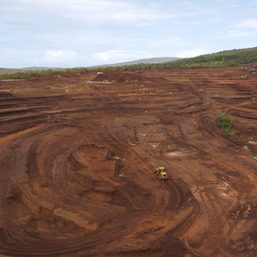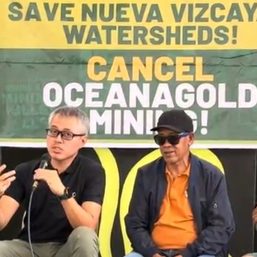SUMMARY
This is AI generated summarization, which may have errors. For context, always refer to the full article.

MANILA, Philippines – Mining companies and environmental activists are waiting for government to settle conditions and explain the vague provisions in Executive Order (EO) 79, the new mining policy of Malacañang.
Talking to Rappler Executive Editor Maria Ressa on TalkThursday: #WhyMining, anti-mining advocate Gina Lopez and Philex Senior VP for Corporate Affairs Mike Toledo both welcomed the new EO as a step in the right direction—in terms of laying down a clear policy as to what government wants.
But Lopez and Toledo said some provisions need to be explained.
“If one goes through the E.O. it is clear that there are still a lot of things to be done. There are some provisions that would require more explanation or clarification,” said Toledo.
Some of questions will be answered by the Implementing Rules and Regulations (IRR) that will be out in 2 months. It will be drafted by the Mineral Industries Consultative Council (MICC) composed of the Department of Environment and Natural Resources and various government agencies and NGOs.
But the bigger issues—such as the revenue-sharing scheme and the currently imposed moratorium—will depend on Congress and there’s no saying how long it will take to deliberate on it.
There is one year left in the current 15th Congress before the next elections. But there are a number of other priority bills pending, including the 2013 budget.
Congress should pass new law soon
Both Lopez and Toledo were concerned about the length of time Congress would take to pass a new mining legislation.
Lopez wants the mining companies to pay more. But it will be up to Congress to legislate a new revenue-sharing scheme.
“The EO is short on the money. Everybody agrees [the mining companies] are not paying enough. But the existing mining companies are not going to pay more until Congress passes a law,” she said.
“They won that part of the battle. They’re not going to pay more unless it passes Congress…. You know how Congress works here. It takes forever,” she said.
The mining companies also want a new law legislated soon. Otherwise, the moratorium stays.
“There is still a moratorium. We are hoping that the president will certify it as urgent and Congress can immediately come up with these laws… so that the moratorium can be lifted,” said Toledo.
Philex chairman Manuel Pangilinan said the Mining EO puts the industry at a standstill and could delay Philex projects.
The Makati Business Club (MBC) earlier asked Congress to pass the new law within the year.
MBC said: “While the issuance of EO 79 is surely an important step forward to resolving the bottlenecks that have hampered the full development of the Philippine mining industry, MBC expresses its concern over the continuing moratorium on new mining agreements pending the passage of legislation rationalizing the revenue-sharing scheme.”
Toledo said Philex is “open to a fair, reasonable progressive rate of taxation” as long as government makes sure it does not tax out business, said Toledo.
He claims that 24% of the revenues of Philex go to taxes—royalties, excise taxes, fees to Indigenous Peoples, property taxes, business taxes, and local taxes among others.
Review existing contracts?
While Lopez lauded the expansion of No-Go zones to include agricultural and eco-tourism areas, Toledo celebrated the Mining EO for honoring existing contracts.
“The good thing about the E.O. is it respects contracts already enforced and in effect. That is a good sign. It sends a good signal to our both local and foreign investors that the Philippies is a country governed by the rule of law,” said Toledo.
But Lopez asked: Some of these [existing] contracts are happening in No-Go zones. When push comes to shove, what takes precedence?
Lopez said she “feels better” after getting assurances from Mines and Geosciences director Leo Jasareno that these existing contracts will be reviewed as mandated in EO 79.
But it is not clear yet how these contracts will be evaluated and what grounds could lead to possible cancellation of contracts.
Large-scale mining companies like Philex often blame small-scale mining companies for the bad reputation of the mining industry. Toledo said large-scale mining companies generally follow environmental regulations.
“They don’t follow good governance rules and principles. Some of them are illegal,” he said.
But Lopez disagreed. “The seven grossly, badly mined sites in the country are all large-scale mining. Large-scale mining has the ability to wreak massive large-scale havoc,” she said.
National gov’t a bully?
Toledo celebrated while Lopez hit the Mining EO for upholding the supremacy of national laws over local ordinances.
It’s not good, said Lopez. “If, for example, the local governments want to go agriculture and eco-tourism, what right does the national government and big business have to bully their way on how they (locals) should live? They’re the ones who are going to suffer,” she said.
But it’s not clear how this will play out.
While the EO upholds national laws, the controversial US$6-billion Tampakan copper-gold project is still in limbo.
The project has been delayed by a ban on open-pit mining imposed by the South Cotabato province. Investors said the ordinance ran counter to national laws.
Environment secretary Ramon Paje said the local ordinance remains valid until it is invalidated by the courts.
“It’s all an issue of governance. If national government is not a bully, I think we are really in a very good place,” Lopez said.
Lopez said she believes sustainable mining is possible, but corruption has been making it difficult to implement in the country.
“Look at Australia, Canada. I heard their mining sites have been converted into forests. It ‘s just the way mining is done in this country. The poorest areas in this country are mining areas. The countries that do horrible mining areas here behave in their countries. Why is this like that? In this country, we have a serious problem with governance,” she said. – Rappler.com
For the existing mining contracts in the Philippines, view this #WhyMining map.
How does mining affect you? Are you pro or against mining? Engage, discuss & take a stand! Visit Rappler’s #WhyMining microsite for the latest stories on issues affecting the mining sector. Join the conversation by emailing whymining@rappler.com your views on the issue.
For other views on mining, read:
| Yes to Mining | No to Mining |
More on #WhyMining:
- Shaping the future of mining
- EO: No new mining contracts
- The Mining EO: A mixed bag
- Mining E.O. not perfect, but very good
- CONVERSATIONS: What are your thoughts on the mining EO? #WhyMining
- Mining E.O. pits gov’t vs local execs
- Correcting lies and disinformation
- Stand for the environment
- How can mining work for Philippines?
- Mining is a social justice issue
- REPLAY: #WHYMINING
Add a comment
How does this make you feel?





There are no comments yet. Add your comment to start the conversation.